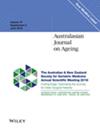A randomised controlled pilot study of a Nintendo Ring Fit Adventure™ balance and strengthening exercise program in community-dwelling older adults with a history of falls
Abstract
Objectives
This pilot study examined the feasibility, acceptability, and effects of a Nintendo Ring Fit Adventure™-based balance and muscle strengthening exercise program in community-dwelling older adults with a history of falls.
Methods
Older adults who have had at least one fall in the past year were randomly assigned to an experimental (n = 21) or control group (n = 21). The experimental group performed 16 exercise sessions in total, lasting 60 min each, twice a week for 8 weeks, whereas the control group received usual care. Feasibility was evaluated based on the scores of participants in the exercises. Acceptance was evaluated using a customised questionnaire examining participants' self-perceived enjoyment, feasibility and improvements. Clinical outcomes including balance (Mini-BESTest), lower limb muscle strength (Five-Time Sit-to-Stand test), mobility (Timed-Up and Go test), dual-task ability (Timed-Up and Go test—Dual Task), fear of falling (Icon-FES) and executive function (Color Trails Test) were evaluated at baseline and 8 weeks.
Results
Thirty-one participants (74%) finished the 8-week assessment. The experimental group significantly improved their scores in six out of eight exercises (all p < .031). The mean scores of the self-perceived enjoyment, feasibility and improvement domains of the acceptability questionnaire were 3.46 ± .53, 3.08 ± .59, and 3.47 ± .57 respectively. A significant improvement in the anticipatory subscore of the Mini-BESTest was found in the experimental group compared to the control group (p = .02; Partial eta squared = .14).
Conclusions
The Nintendo Ring Fit Adventure™-based exercise program was feasible, acceptable, and potentially effective in community-dwelling older adults with a history of falls.

 求助内容:
求助内容: 应助结果提醒方式:
应助结果提醒方式:


